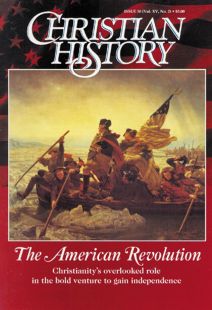Letters to the editor
AOL: Very interesting! As a student of medieval history, I think you did a very credible job with a very touchy subject. I’ll bet you get a lot of letters about your “revisionist” history; the Reformation myths about medieval Europe are some of the most enduring and stubbornly held historical errors. Keep up the good work!
Cunneen@aol.com
AOL: In “From the Editor,” you allege that the High Middle Ages— “from roughly A.D. 1000 to
1500'— was “a time in history when Christianity was one.” For roughly 54 years only [before the Great Schism of 1054] was Christianity one, and that in the midst of longstanding differences between Western and Eastern Christians. Furthermore, according to most historical timelines with which I am familiar, the High Middle Ages lasted from roughly 1000 to 1350. Even the Western Church was divided for a period after 1378 [by the Great Papal Schism].
Quinn Fox
Boulder, Colorado
Quinn: I'm afraid you caught me committing hyperbole—though I think the exaggeration was justified. Even during major schisms, all parties shared unified religious conventions and a common worldview —hardly true before or since. And though most historians say the “High” Middle Ages ends around 1350, recent studies convince me there wasn’t significant decline afterward—thus my willingness to stretch high-mg
LETTER; I have enjoyed Christian History for many years and appreciate the much-needed insight regarding our wonderful Christian heritage. Yet, as I read “Everyday Faith, I was very disappointed. Where previous issues appeared to expose and even criticize the heresies of the Roman Catholic Church, this issue not only lacked such conviction but seemed to condone or, even worse, agree with blatant heterodoxy. I do not expect your periodical to be iconoclastic or antagonistic, “peace if possible, but truth at any rate” was Luther’s aphorism and would seem to be an excellent goal for us all.
Rick Allen
Leakey, Texas
FAX: I must say I have not seen such a piece of revisionist historical writing for quite some time.
First, Roman Catholicism is not “Christian.” Certainly you understand the doctrine of justification by faith! Such Reformation slogans as solafide and sola gratia dramatically contrast that which you so glibly call “Christian.”
Second, much of the so-called unity you write about was fostered by popes and councils through various forms of coercion: if pleading did not work, then perhaps confiscations, tortures, murders, and interdict! You really glossed over the dark side of Catholicism.
I wonder, if they could come back, what all the martyred Huguenots, English, Waldensians, and Germans would say to you about the “loving kindness” of the church of Rome?
Rev. Paul K. Christianson
Clarkston, Washington
Rick and Paul: Thought-provoking letters! Still, just to review some fundamentals of CH: (1) we’re committed evangelicals who happen to think even the medieval church,for all its tragic flaws, has something to teach us; and(2) though we do not condone everything we cover, we do seek to understand sympathetically all church eras
—MG
AOL: Your articles on the medieval church are enlightening. I sometimes wish our U. S. “civil religion” could return to the “good old days” (when there was no dichotomy between culture and religion), but your articles give me both perspective and pause for my wish. Thank you.
Rev. Ken McCaw
Kalamazoo, Michigan
Radicals in CH
AOL: I'm a pastor leading a church and constantly gain courage from the saints who have gone before. When I say something difficult, I usually tell my folks I'm not radical; compared to the people featured in CH, I'm a wuss.
Phil Mathis
Waco, Texas
By Our Readers
[Christian History originally published this article in Christian History Issue #50 in 1996]
Next articles
Heresy in the Early Church: Did You Know?
Remarkable or little-known facts about heresy in the early church.
Tony LaneFinding the Truth
How the earliest church decided Marcion and the Gnostics, among others, were wrong.
Justo González, Jr.Heresy in the Early Church: A Gallery of Malcontents for Christ
The mixed motives and odd teachings of four notorious heretics.
Stephen MillerRisky Lifestyles
It wasn’t just what Christians believed but also how they lived that concerned early church teachers.
Robert Krupp



